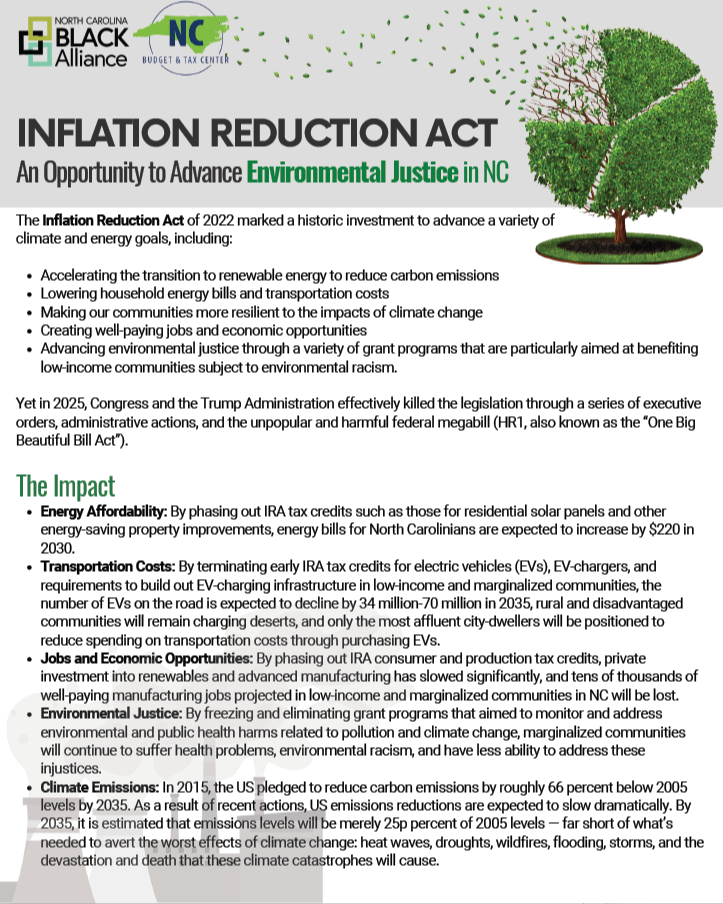
NC lawmakers haven’t passed a comprehensive state budget. What does that mean for me?
Two months into the new fiscal year and following the start of another school year, legislative leaders in North Carolina still haven’t passed a comprehensive state budget. Here’s what that means for you and your community.
What happens if lawmakers don’t pass a budget? Does state government shut down?
No. If lawmakers fail to pass a budget before the July 1 start of the new fiscal year — as they did this year — state government doesn't shut down.[1] Instead, the state operates on a continuation budget. This means that agencies and institutions receive the same level of funding as they did the previous year. But here’s the catch:
- They don't get last year’s one-time funding that was designated as “non-recurring,” in most cases.
- Most importantly, they don’t see their budgets adjusted to account for population increase, inflation, or other sources of increased need.
In short, state services stay flat while costs and demands keep going up.
What are the impacts of a continuation budget?
No matter who we are, what we look like, or where we live in North Carolina, all of us experience the consequences of operating on a continuation budget rather than a comprehensive one. Here are some of the biggest impacts:
- K-12 public school teachers and students: On a continuation budget, teachers’ salaries are frozen, and they don’t move up the salary schedule — let alone receive a meaningful raise after years of inadequate pay. Public schools are expected to operate with no increased dollars to match higher enrollment numbers. (This year, lawmakers passed a “mini-budget” in July to fund step increases and enrollment growth, overriding this and other portions of the continuation budget. Please see the sections on mini-budgets below for further details.)
- Employees and students in higher education: Similarly, salaries are frozen at community colleges and public universities on a continuation budget, and institutions are expected to operate with no increased funding for additional students.
- Medicaid patients and rural economies: Because the cost of medical services usually increases each year, a continuation budget threatens health care workers’ ability to provide life-saving care for Medicaid patients. Insufficient Medicaid funding also hurts local rural economies where hospitals that receive a large share of their revenue from Medicaid are a major employer.
- Parents of young children: North Carolina is experiencing a child-care crisis. Maintaining last year’s funding means continued low pay for workers, more centers closing, higher costs for parents, not enough slots for our children, and more parents pushed out of the workforce.
- Survivors of climate disasters: State lawmakers’ approach to Helene recovery has fallen short in many ways, from waiting on federal dollars that the Trump administration has been holding up, to shortchanging Western NC residents’ need for housing funds and failing to take seriously the need to stabilize the economy in the region. A continuation budget makes a bad situation worse by creating additional uncertainty for local communities in the mountains that are struggling to recover. It also fails to provide sustained funding for climate disaster prevention, preparedness, and recovery.
What’s a “mini-budget?”
When lawmakers can’t agree on a comprehensive budget, they'll often resort to passing small spending bills that fund limited priorities. These bills are sometimes called “mini-budgets,” and they override the continuation budget for the specific areas that they fund.
But piecemeal budgeting is harmful to the well-being of North Carolina’s communities. Annual budgets provide clarity about state priorities, while a piecemeal budget:
- Creates uncertainty for state agencies and makes them less effective;
- Prevents local governments from planning sustainably for their communities;
- Allows lawmakers to recklessly delay decisions about how to sustain long-term funding for state priorities in the context of endless tax cuts for the rich; and
- Makes it harder to track budget choices and hold lawmakers accountable to the people they were elected to serve.
Didn’t lawmakers pass a mini-budget this year to deal with the negative impacts of a continuation budget?
The state legislature passed a small spending bill at the end of July to fund a few time-sensitive needs, like enrollment growth in public schools and community colleges and scheduled step increases in salaries for teachers and state employees.
But like all mini-budgets, this one left out far more than it covered. It failed to:
- Fund enrollment growth at public universities, which are already experiencing a federal funding crisis and resorting to layoffs in some cases
- Provide meaningful raises for K-12 teachers, whose average pay dropped 5 spots this year to 43rd in the country
- Support child-care subsidies that more closely match the actual cost of providing care and could prevent additional centers from closing
- Fully fund Medicaid (since the mini-budget provided less funding than NC Medicaid needs to continue current Medicaid services and payments to health care providers, providers will get less money for providing the same services and some may decide that they can’t afford to accept Medicaid)
- Protect health care and food access for the hundreds of thousands of North Carolinians at risk of losing it due to Congressional Republican’s harmful megabill, signed into law by President Trump.
North Carolina is a rapidly growing state in an inflationary time – only a comprehensive budget can ensure that state services keep up with population growth, costs, and needs. Piecemeal budgeting just won’t cut it.
[1] In 2016, the North Carolina General Assembly passed a law that said the state will continue with prior spending levels if a budget is not passed by the start of the new fiscal year. This means the state will never “shut down” in the same way the federal government has shut down when it can’t agree on a budget for the federal government. This also means that General Assembly leaders don’t have a hard deadline like they used to, and the lack of urgency creates uncertainty for agencies, local leaders, and regular North Carolinians trying to access high-quality state services.




